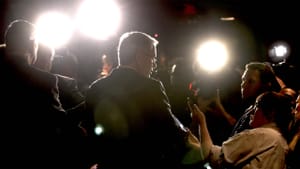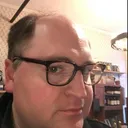Stay in the Loop
BSR publishes on a weekly schedule, with an email newsletter every Wednesday and Thursday morning. There’s no paywall, and subscribing is always free.
The Krasner wars come to PBS
Sundance Film Festival presents ‘Philly D.A.’

In Philadelphia’s contentious political culture, few things set off more fury than the subject of District Attorney Larry Krasner. Philly D.A., a new docuseries showcasing his platform, office, and detractors, got a premiere of its first two episodes at the 2021 all-virtual Sundance Film Festival.
The longtime defense and civil-rights attorney was elected district attorney of Philadelphia in 2017 on an ambitious platform of criminal-justice reform, and has been one of the few Philadelphia politicians of recent vintage to promise major change and actually deliver it.
But Krasner’s reforms have also set off a major backlash, from police and their backers, from career prosecutors fired from his office, from the families of crime victims, and from some corners of the media. That backlash has intensified, following the events of summer 2020, and with Krasner’s re-election campaign looming this spring.
Inside the office, inside Philly
All of that, and much more, is explored in the new eight-part docuseries that’s set to air on PBS stations beginning in April, under its Independent Lens documentary label. The first two episodes of Philly D.A. debuted February 3, as the final major premiere at this year’s Sundance. (Our own WHYY is delaying its TV broadcast of the series until after the November general election, but it will be available to stream on PBS apps in April.)
The series, created by local filmmakers Ted Passon, Yoni Brook, and Nicole Salazar, is exactly what I was hoping it would be: an inside look at Krasner’s work as district attorney, while also a sprawling examination of the city itself, with all of the necessary context filled in about Philly’s long history of complex political and racial dynamics.
Yes, Philly D.A. is about Larry Krasner, but it’s just as much about Frank Rizzo, Mumia Abu-Jamal and Daniel Faulkner, and the MOVE bombing, even if those things are mentioned only in passing. Based on the first two hours—I have not seen any of the rest of the series—Philly D.A. takes its place in the pantheon of Philadelphia-based political and social documentaries since the turn of the millennium, along with Tigre Hill’s Shame of the City, Tommy Oliver’s 40 Years a Prisoner, and Jason Osder's Let the Fire Burn, which like Philly D.A. was a PBS Independent Lens film.
The anti-Krasner
The documentarians, who got close access to the DA and his staff, are clearly sympathetic to Krasner and his mission. But they're also fair, and not shy about depicting mistakes by Krasner and his office, including their mishandling of the firing of several veteran prosecutors (“I’m not good at retail politics,” Krasner admits at one point.)
Philly D.A. lets the anti-Krasner have their say, and clearly articulates why they feel the way they do. That faction is led by the Fraternal Order of Police’s Lodge 5 and its chief, John McNesby, a longtime Krasner enemy from the days when Krasner used to regularly sue the Philadelphia Police Department. McNesby is not interviewed in the first two hours of the documentary, but is featured in lots of news footage—all familiar talking points by now. News stories with anonymous quotes from police officers bashing Krasner have become a regular feature in the local media, especially in recent months.
Philly D.A. is not quite pure cinéma vérité in the tradition of Frederick Wiseman, but the documentary mostly eschews documentary bells and whistles, with no narration and many long scenes of people in meetings. There’s a fair but not overwhelming amount of archival footage, some of which features a young Krasner, at one point sporting a ponytail.
Battles on the left
But Philly D.A. is also valuable in that it shows us the behind-the-scenes of various events that were in the news circa 2018. Most notably, we see the aftermath of Krasner’s staff discovering a document, created by the previous administration and buried in a file, listing Philadelphia police officers who aren’t to be trusted to testify in court. We later see Krasner and others debating what offenses committed by cops will deem them eligible for that “do not call list,” one of which is “fighting at a wedding reception.”
Later, there’s a fascinating scene in which a group of holdover staffers from the pre-Krasner era—the ones who had previously been seen as the liberals in the office—find they have little to agree on with the more progressive newcomers. It’s a dynamic that should be quite familiar to anyone who's followed inter-left battles in various institutions over the last few years.
I’m not sure how long the filmmakers followed Krasner, and whether the cameras were still on for last year’s Black Lives Matter protests, the gassing of protestors on 676, or other events in the summer of 2020. But even if they weren’t, I’m already excited for Philly D.A. to air, and for Philadelphians to start talking about it.
Image description: A photo of Larry Krasner from behind, facing a crowd of journalists. The cameras’ lights make a bright outline around Krasner’s dark figure and profile as he turns his head to speak to reporters.
What, When, Where
Philly D.A. Created by Ted Passon, Yoni Brook, and Nicole Salazar. Premiered its first two episodes at the all-virtual Sundance Film Festival on February 3, 2021. The eight-part series debuts April 20 on PBS stations and streaming apps, and will air on WHYY-TV after the November election. For more information, visit pbs.org.
Sign up for our newsletter
All of the week's new articles, all in one place. Sign up for the free weekly BSR newsletters, and don't miss a conversation.

 Stephen Silver
Stephen Silver